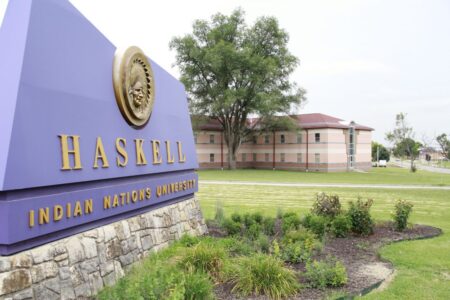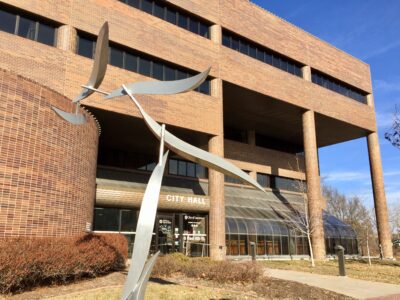Douglas County Commission will set the stage for hearing on permit application for 1,100-acre solar energy facility

photo by: Journal-World
The west side of the Douglas County Courthouse, 1100 Massachusetts St., is pictured on Sept. 23, 2021.
On Wednesday, the Douglas County Commission will set the stage for an upcoming hearing that could result in the approval of the first commercial-scale renewable energy facility in Douglas County.
At this week’s County Commission meeting, leaders will be learning more about the Kansas Sky Energy Center project, a joint venture from Kansas City energy firm Savion and Evergy proposed for 1,105 acres just north of Lawrence and west of Lawrence Regional Airport, about 604 acres of which would actually be covered by solar panels.

photo by: Savion
This map shows the proposed project area for Kansas City-based Savion’s “Kansas Sky Energy Center,” a 1,000 acre solar energy project the company wants to be located just north of Lawrence.
Commissioners will hear presentations from county staff and the applicant during Wednesday’s work session, which starts earlier than usual at 3:30 p.m.
The County Commission does not take action on work session items, nor do work sessions provide an opportunity for public comment. Instead, those actions will be taking place at a special business meeting set for 9 a.m. Saturday, April 13, during a public hearing to consider the project’s conditional use permit application.
A contentious issue
This is the first time the Kansas Sky Energy Center project has reached the County Commission, but it should be familiar to people who have paid attention to earlier steps in the planning process. Most recently, the Lawrence-Douglas County Planning Commission considered whether to recommend that the County Commission approve the application, ending up in a split vote.
In practice, that split vote will function the same way as a recommendation for denial. It means that for the permit to be approved, the County Commission’s vote would need to be unanimous.
But even if the Planning Commission had recommended the project for approval, the County Commission’s vote would still have to be unanimous to approve the permit. That’s because a group of people who own land near the proposed project site filed a valid protest petition.
Not just anyone can file a protest petition against a project — it can only come from landowners whose properties are close enough to the project that they were required to be notified of the permit request. That generally means properties within 1,000 feet of the project site. The protest petition then has to get signatures from 20% or more of those landowners in order to be valid.
This one got 41 signatures — about half of the 84 qualifying landowners in that area — and County Clerk Jamie Shew certified it as valid just after the start of the new year.
It’s not just people near the project area who have strong opinions about it. The project has drawn many written and in-person public comments at previous meetings, including people who oppose the project based on its location. As the Journal-World has reported, some opponents are concerned about the project covering some of the highest-rated and most productive farm ground in the county.
Roughly 20 written comments are included with the agenda for Wednesday’s meeting. Nine urged commissioners to approve the project, eight urged them to vote against it, and the rest didn’t ask commissioners to vote in a specific way. One submission came from the “Save Our Planet” collaborative; it urges commissioners to support the project and is signed by 20 people, including state Rep. Boog Highberger and state Sen. Marci Francisco as well as farmers and some neighbors of the project area.
Because of the protest petition, public comments and numerous other pieces of documentation, the agenda materials for meetings at which the project is discussed can span hundreds of pages. This week’s meeting agenda packet devotes more than 700 pages to the Kansas Sky Energy Center work session.
What’s changed since December?
Since the Planning Commission’s discussion in December, the project applicant has made a few changes and additions to the application. They’re detailed in a memo in Wednesday’s meeting agenda.
One item of note is an economic study about the project, which found that its potential impacts — including job creation, earnings, taxes paid and other economic outputs — are in excess of $269 million, including just over $61 million in estimated new tax revenue during the 25-year term of the conditional use permit. The memo claims that comparatively, the estimated taxes paid during the same period would total less than $1 million if the land remained agricultural.
That differs from previous estimates from the project team. Last year, the team was estimating the facility could produce more than $110 million in new property tax revenue.
A few of the conditions for the permit have been revised, too. One of them has to do with when construction activities could take place at the site. The original version of the permit would have allowed construction activity and traffic between 8 a.m. and 8 p.m. Monday through Friday. The revision would allow construction activity and traffic between 7 a.m. and 6 p.m. Monday through Saturday.
The memo says the applicant is interested in discussing “good neighbor” agreements with all property owners affected by the construction — “These agreements would create opportunity for the owners to request specific types of screening and other accommodations, and could also include certain monetary compensation,” the memo reads.
Another revised condition states that the project operator — which is set to be Evergy, provided the conditional use permit application is approved — will fund a “vegetation bond” to ensure that vegetation is replanted at the project site after “soil-disturbing activities” are completed.
The memo also mentions “agrivoltaics,” the use of land for solar energy generation and agriculture at the same time. Earlier this month, the memo says, Evergy entered a memorandum of understanding with conservation nonprofit The Nature Conservancy, and they will work to develop a plan for how agrivoltaics might work on the project site if the permit is approved.
In other business, commissioners will:
• Consider authorizing Douglas County Administrator Sarah Plinsky to execute a memorandum of understanding with the City of Lawrence detailing the obligations of the city and county’s funding commitment to the Kansas Department of Transportation’s South Lawrence Trafficway west leg expansion project.
The city and county have each planned to spend $7 million as part of a $14 million local match KDOT requires for the project, but as the Journal-World has reported, the city balked at the idea of putting about $3.6 million of its contribution toward an extension of Wakarusa Drive south to North 1000 Road.
Instead of that project, the city proposed a number of alternative projects that fulfill the local match requirement, in exchange for the county fully funding the Wakarusa Drive extension. The list includes projects like property acquisitions and the annexation of a portion of 31st Street north of Kansas Highway 10. About two-thirds of the funding exchange — an estimated $2.2 million — will go toward releasing the county from its obligation to participate in future improvement districts near the Douglas County Jail and Douglas County Public Works Building on East 25th Street.
• During an executive session, consult with the county counselor. The reason given for the executive session is to maintain attorney-client privilege “on a matter involving Douglas County.”
With renovations underway in the County Commission’s usual meeting space at the Douglas County Courthouse, meetings for most of this year will take place in the Douglas County Public Works training room at 3755 E. 25th St. Wednesday’s work session begins at 3:30 p.m., and the regular business meeting begins at 5:30 p.m. The meeting will also be available via Zoom.







COMMENTS